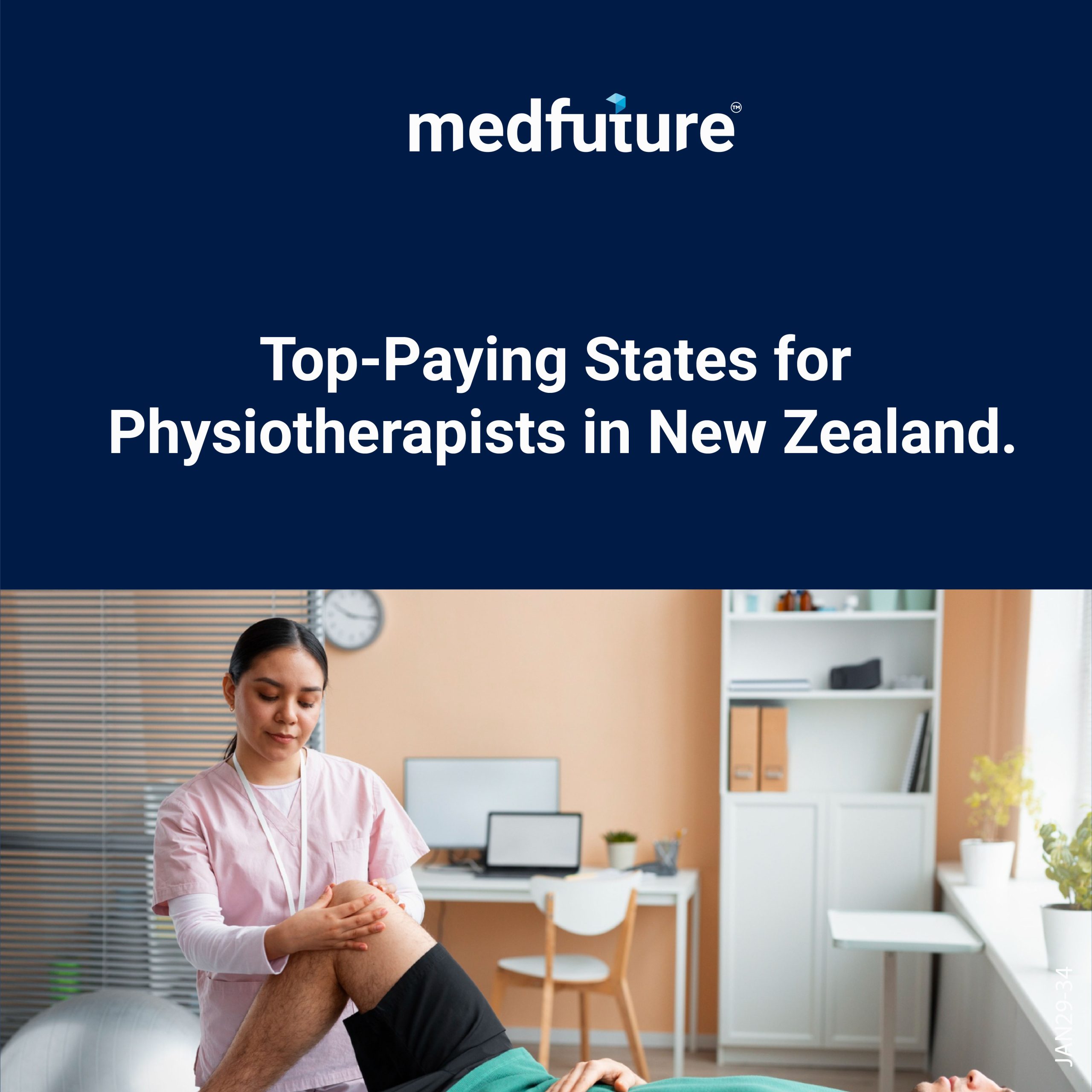Physiotherapy is a rewarding career that plays an important role in helping patients recover from injuries and manage pain. However, as a physiotherapist, you’ll want to maximise your earning potential to support yourself and your family in 2024 when the economy is a very unstable factor. This blog examines salary data from Indeed to uncover the highest-paying locations for physiotherapists in New Zealand. We’ll also provide insights into the cost of living, work-life balance, and lifestyle benefits of each top-paying area.
To earn a good salary as a physiotherapist in New Zealand, you’ll need formal qualifications and clinical experience. The typical step would be to earn a bachelor’s degree in physiotherapy from an accredited university programme. From there, you’ll need to gain several years of hands-on experience working in the field.
The average annual salary for physiotherapists in New Zealand is NZD 60,000. However, salaries can vary depending on factors like location, specialisation, and level of experience. Therapists working in major cities usually earn more than those in rural areas. Those with specialisations in areas like sports injuries or women’s health also tend to command higher salaries.
With additional training and experience, physiotherapists have options to increase their earning potential over time. For example, pursuing a master’s degree in a specialised area of physiotherapy could qualify you for more senior clinical roles or private practice opportunities. Gaining additional certifications also enhances your skills and makes you eligible for higher-paying positions. Building a large network of referrals through many years of client care is another way experienced therapists augment their salaries.
In summary, while a bachelor’s degree is the minimum educational requirement, physiotherapists in New Zealand have a career path. This allows for salary growth corresponding to their level of qualifications and experience gained over years of practising in the field. Specialising, continuing education, and experience all contribute to higher earning potential long term.
Wellington City
The capital city of New Zealand tops the list, with physiotherapists earning an average annual salary of NZD 77,095. Wellington is the top-paying state for physiotherapists in New Zealand. As the seat of government, Wellington is a hub for healthcare and offers no shortage of job opportunities. You’ll find positions in hospitals, private practices, sports clinics, and more.
With an ageing population and active lifestyle, Wellington has a significant need for physiotherapists. The capital is projected to face a shortage of over 100 physiotherapists by 2030 if demand continues rising at the current rate. Hospitals, private practices, and sports clinics in Wellington are constantly recruiting to fill open positions.
In Wellington, the average rent for a 2-bedroom apartment is approximately $450-550 per week. Groceries and utilities will cost around $200-300 per week for a single person. With the average physiotherapist’s salary of $77,095 before tax, living costs in Wellington are manageable on that income.
While the cost of housing in Wellington is on the rise, the overall cost of living remains moderate compared to other major cities. You’ll have your pick of urban amenities while also being close to nature escapes like mountain biking trails and beaches. Wellingtonians embrace the great outdoors – you’ll find many physiotherapists who stay active by running, cycling, or kayaking after work and on weekends.
Wellington is known for its windy weather conditions, with strong southerly winds blowing nearly 300 days per year. However, summers in Wellington are generally mild and dry, with average temperatures ranging from 15-20 degrees Celsius. Winters see more rain and cooler temperatures around 10 degrees. The capital experiences over 2,000 sunshine hours annually.
Auckland City
In second place is Auckland for top paying states for physiotherapists, where the average physiotherapist salary is $71,773 per year. As the largest urban area in New Zealand, Auckland has a high demand for physiotherapists to serve its growing population. Housing costs are steep but salaries make up for it.
As the largest urban centre in New Zealand, Auckland has the highest physiotherapy job numbers in the country. Over 1,300 physiotherapists were employed in the region as of the last census. With population growth expected to continue, estimates show Auckland will require an additional 200-300 physiotherapists in the coming decade.
Housing is most expensive in Auckland, where rents average $550-650 weekly for a 2-bedroom place. However, costs of living like food and transport are comparable to other major cities. An Auckland physiotherapist earning $71,773 per year could afford rent and essential expenses without too much financial strain.
Auckland offers physiotherapists a vibrant city life with top restaurants, arts, and entertainment. You’ll never run out of things to do on your days off. The city also has a strong sports culture – you could find work with professional rugby or cricket teams. On weekends, you may choose to relax at the beach or explore the forests and islands that surround Auckland.
Auckland enjoys a subtropical climate, protected by the Hauraki Gulf. Summers are warm and dry from December to February, with average highs of 23 degrees. Winters are mild, with average July temperatures of 12 degrees. Auckland receives over 2,300 sunshine hours per year and annual rainfall of 1,200mm spread fairly evenly throughout the year.
Christchurch
Coming in third is Christchurch for top paying states for physiotherapists, with an average annual salary of $70,893 for physiotherapists. As the largest city on the South Island, Christchurch has a large healthcare sector and sports community in need of physiotherapy services.
Following the 2011 earthquakes, demand for physiotherapy skyrocketed in Christchurch to aid reconstruction workers and residents coping with injuries. While the need has levelled somewhat, the city still employs around 500 physiotherapists. With an ageing population like other major centres, Christchurch anticipates ongoing demand for physiotherapy to treat musculoskeletal issues.
Christchurch has the most affordable housing – average rent for a 2-bedroom apartment is $400-500 weekly. Combined living costs are around $500-600 per week. On the $70,893 average salary, Christchurch provides a comfortable standard of living for physiotherapists that makes the salary stretch further.
Christchurch physiotherapists enjoy an excellent work-life balance and mild climate. Housing is more affordable than other major cities. In your free time, you can explore the scenic coastlines, vineyards, and mountains that surround Christchurch. Outdoor activities like hiking, cycling, fishing and more are popular ways for locals to unwind.
Christchurch experiences a temperate climate influenced by the Pacific Ocean and inland plains. Summer days are usually warm and sunny with temperatures averaging 23 degrees from December to February. Winters are cooler and drier, with average July temperatures of 8 degrees. Christchurch receives over 2,100 hours of annual sunshine and around 640mm of rainfall concentrated in winter months.
The Job market
All three top-paying states for physiotherapists face physiotherapist shortages if current demand trends continue. For job security and an abundance of opportunities, these locations in New Zealand offer physiotherapists access to a thriving market. The high salaries also reflect the critical need for skilled physiotherapists to keep up with patient demand in Wellington, Auckland, and Christchurch. In all three top-paying cities, physiotherapist incomes exceed the national living wage and allow for discretionary spending after paying rent and bills. While Auckland has the highest cost, salaries also compensate best. Overall, the salary levels in these locations provide physiotherapists with sufficient earnings to cover living expenses.
Relocating to Wellington, Auckland, or Christchurch is made relatively straightforward for foreign physiotherapists thanks to convenient domestic flight connections between the cities. While securing long-term housing can be challenging due to competitive rental markets, employers are often willing to assist with temporary accommodation. Essential services needed to settle in are accessible within a few weeks of arrival. International schools and welcoming public school systems also help with relocation for families. Overall, these major cities offer foreign physiotherapists looking to move to New Zealand an environment with established support networks to aid their transition. Demand for physiotherapists remains high across both public and private healthcare sectors. Therefore, qualified international graduates have good opportunities to find work and build a career in their chosen location.
Why relocate?
The thriving healthcare hubs of Wellington, Auckland, and Christchurch present foreign physiotherapists with a wealth of opportunities to advance their careers as these are the top-paying states for physiotherapists. As locations facing significant shortages of skilled physiotherapy professionals, these cities consistently rank among the highest paying in New Zealand – offering average annual salaries upwards of $70,000. Beyond financial compensation, relocating to one of the top destinations provides access to stable, in-demand jobs with prospects for professional growth.
Physiotherapists settling in these urban centres will enjoy lifestyles surrounded by natural beauty, with activities like hiking, beachgoing, and more to maintain a balanced work-life routine. Wellington, Auckland, and Christchurch also boast vibrant culinary scenes and cultural offerings to indulge in outside of work. Support structures from employers, registration authorities, and immigrant networks further streamline the transition process for qualified international graduates seeking residency.
With their robust healthcare infrastructures and sports communities well-matched to physiotherapy expertise, these major New Zealand hubs present a match made for career success. The combination of career-advancing salaries, desirable locales, and supportive environments make Wellington, Auckland, and Christchurch prime landing spots for foreign physiotherapists to put down roots long-term. Their in-demand skillsets are a boon for locals while allowing international professionals to thrive professionally and personally.
In conclusion, Wellington, Auckland, and Christchurch provide physiotherapists with highly competitive salaries and rewarding career opportunities in environments conducive to achieving a great quality of life balance. All three cities face ongoing shortages of skilled physiotherapy professionals to meet the needs of their growing populations and sports communities. This makes these urban hubs prime landing spots for foreign graduates seeking residency and employment. Thinking about moving to New Zealand and enjoying all these perks? Check out the best physiotherapy jobs for 2024 in New Zealand on the Medfuture site and apply today.






